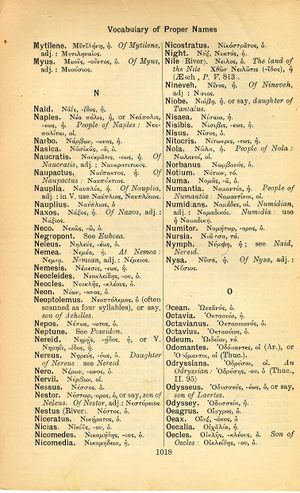Nola
Ἀναξαγόρας δύο ἔλεγε διδασκαλίας εἶναι θανάτου, τόν τε πρὸ τοῦ γενέσθαι χρόνον καὶ τὸν ὕπνον → Anaxagoras used to say that we have two teachers for death: the time before we were born and sleep | Anaxagoras said that there are two rehearsals for death: the time before being born and sleep
English > Greek (Woodhouse)
Νῶλα, ἡ.
People of Nola: Νωλανοί, οἱ.
Latin > English (Lewis & Short)
Nōla: ae, f. nolo,
I the Unwilling, an appellation sarcastically given to the dissolute Clodia: in triclinio Coam, in cubiculo Nolam, Cael. ap. Quint. 8, 6, 53. >
Nōla: ae, f.,
I a city of remote antiquity in Campania, founded by the Ausonians, afterwards conquered by the Tuscans, and colonized by the Chalcidians, still called Nola, Liv. 9, 28; 23, 14; Plin. 3, 5, 9, § 63; Cic. Brut. 3, 12; Vell. 1, 7, 2 sq.; Just. 20, 1; Sil. 12, 161.—Hence,
A Nōlānus, a, um, adj. (Nŏlānus, Prud. στεφ. 11, 308), of or belonging to Nola, Nolan: ager, Liv. 23, 14: plebs, id. 24, 13; Sil. 12, 293.—In <number opt="n">plur.</number> as subst.: Nōlāni, ōrum, m., the Nolans, Liv. 8, 25 and 26.—
B Nōlensis, e, adj., of Nola: episcopus, Aug. Civ. Dei, 1, 10.

